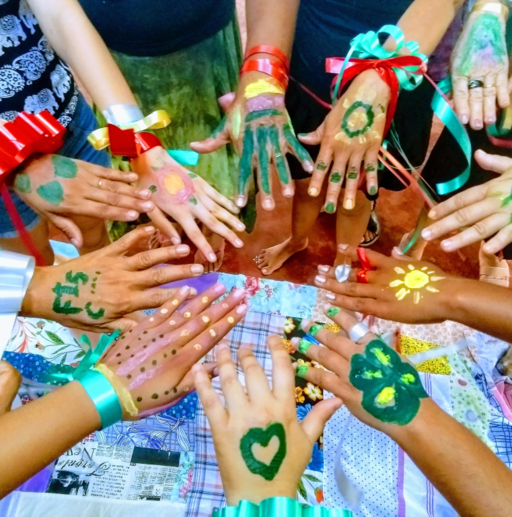
c.a.s.a.
isabel viana y melissa caminha
The project c.a.s.a. wishes to contribute to the debate around cultural rights and the right to belong to a city, especially for the different diasporic communities of Barcelona. Through applied arts, such as education and mental health, c.a.s.a. envisions collective creation, experimentation and production. At the same time, it celebrates diversity and cohabitation through the difference.
Its methodology mixes theory and practice from a festive approach. Since Isabel Viana and Melissa Caminha understand that bonds, affections and emotions are fundamental for the transformation of the city, their practice focuses on caring and celebration.
The project is configured through the collectivization of personal experiences and workshops for women, where they find a political space to commonly struggle, make themselves visible and occupy the city through arts and culture. But also as a caring, bonding and celebration space that pays attention to the politics of the re-existence and does not forget how to celebrate life.
related activities
C.A.S.A. knitting memories, links and affections
wednesday 26 april 2023
21:00h - L'occulta, Barcelona
As a result of the project developed by Melissa Caminha and Isabel Viana, that focused on giving visibility to migrant cultural spaces and groups led by women, C.A.S.A. has produced a short documentary film that records different artistic and caring activities carried out with members of Ciclo Mujeres, founded by Dai Sombra Aysha, a cultural producer and anti-racist activist living in Barcelona.
about the artists
Isabel Viana considers herself a proponent of artistic, therapeutic and community experiences. Her professional career has been linked to the Arts and Participation sphere since she started studying Performing Arts in 2002. After that, she went to Rio de Janeiro, where she collectively coordinated several projects of applied arts in the Associação Gira Mundo, the Brazilian Amazon, etc.
She holds a Master’s degree in Combined Artistic Languages at UNA (Buenos Aires, Argentina) and has done a Postgraduate Course in Art Therapy. Her approach to Therapeutic Arts started in 2012 when she proposed an artistic project with women in a situation of social violence in Rio de Janeiro. Since then she has developed creative practices in therapeutic and psychiatric environments and managed multiple actions in Movimento Saúde Mental.
She is currently studying a bachelor in Psychology (UNED) and is developing a theoretical and practical research on what she calls the "biopoetic act", an artistic act that calls for the construction of a creative state of mind as a vital condition and makes it possible to reconstruct autobiographical stories and re-existence. She also participates in a group with the supervision of Eugenia Aptecar at Clinica Entre-Prácticas (Argentina).
She is an art therapist and workshop leader at the Club da Terapia expresiva and collaborates with the Master in Psycho-expressive Therapies at the Instituto IASE (Spain).
Melissa Caminha is a clown-mother, art educator and transdisciplinary researcher. Already in the Bachelor’s degree in Performing Arts she initiated herself into the clown culture with the theater company Teatro Gira. Her personal transformation experienced during this time left a mark on her entire artistic and academic career. Her final thesis investigates the pedagogical and political potential of the clown from the poetics of Bertolt Brecht and the vital testimony of more than twenty clowns.
After that, she continued with a specialization in Art Education, studying the contribution of theatrical collectives to the Pedagogy of Theater and educational research in Brazil. The next cycle of her academic career culminated with a Masters and PhD in Arts and Education, at the school of Fine Arts of the University of Barcelona, where she wrote the thesis “Clowns: Stories, bodies and ways of representing clowning from a gender perspective”, based on feminist-queer-crip art and theory.
The next step was a postdoctoral stay as an invited researcher at the School of Sociology and Social Policy at the University of Leeds, where she continues researching about clowns, now from an intersectional and decolonial approach.
Currently, she is a Ph.D. and Associate Professor in the Performing Arts Degree at the University School ERAM (UdG), where she coordinates various subjects such as circus, clown and applied performing arts, among others. She also collaborates as a teacher in the Master of Cultural Management at the Open University of Catalonia (UOC).
